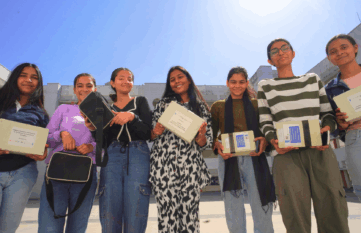BMZ Digital Forum: AI revolution in development cooperation?

Under the theme ‘AI at your fingertips – how is technology revolutionising development cooperation practice?’, the Digital Forum of the German Federal Ministry for Economic Cooperation and Development (BMZ) took place on Tuesday in Berlin.
Interested parties and experts from BMZ, GIZ, KfW, DEval and other German development cooperation organisations came together to discuss the opportunities, risks, and specific applications of artificial intelligence (AI) in development cooperation together with partners such as Smart Africa, Local Development Research Institute and SUPERRR Lab.

Noémie Bürkl © GIZ
Around 80 per cent of the SDG sub-goals could be achieved more quickly through the targeted use of AI – from better agricultural yields and more targeted distribution of vaccines to citizen services in local languages.
Noémie Bürkl (German Federal Ministry for Economic Cooperation and Development)
Seizing opportunities, mitigating risks
Digitalisation is shaping our everyday lives – but no other technology is currently being discussed as intensively as AI. And not without reason: AI will transform our everyday lives, the economy and the working environment, as well as policymaking, and can also be a driver for achieving the Sustainable Development Goals (SDGs). Around 80 per cent of the SDG sub-goals could be achieved more quickly through the targeted use of AI – from better agricultural yields and more targeted distribution of vaccines to citizen services in local languages.
But like any technology, AI carries risks: it can reinforce existing inequalities or create new dependencies, for example because algorithms discriminate against marginalised groups due to a lack of data, or because the necessary technological knowledge about AI is concentrated in a small number of players. And sometimes it is difficult to say whether the benefits outweigh the potential harm: AI can provide solutions to improve climate protection – at the same time, the high energy consumption of AI applications is a challenge for global climate policy. At the Digital Forum, there was a consensus that promoting human-centred, open, trustworthy, responsible, and sustainable AI is essential to ensure that the technology’s potential for sustainable development is fully realised.
The problems of AI are complex, and we don’t talk enough about most of them yet: from discrimination and compliance to global labour conditions, to investment in the ‘wrong’ end of the technology stack – that is, in short-term profits rather than in innovations that promote sustainability and justice.
Elisa Lindinger (SUPERRR Lab)
Working together for a just AI future
Since 2019, the BMZ has been actively committed to the use of AI in development cooperation, making it one of the pioneers among donor countries worldwide. The specific examples from the BMZ portfolio that were presented at the Digital Forum illustrate exactly how: AI is helping with early cancer detection in Cambodia, for example, or with the evaluation of projects in the circular economy. The flagship initiative of the national AI strategy, FAIR Forward, was also showcased:
Thanks to Fair Forward, more than 500 million people in Africa and Asia benefit from open language technologies – AI is helping with agricultural consulting or in the health sector, for example. In India, Kenya, Ghana and South Africa, FAIRForward is also promoting AI systems for crop forecasting and pest control. As a result, more than 400,000 smallholder farmers have been able to increase their crop yields.
By using open AI technologies, we enable smallholder farmers to access hyperlocalised early warning and climate sensitive advisory messages that allow them to take action to protect their crops from failure.
Muchiri Nyaggah (Local Development Research Institute Kenia)
In addition to its innovative AI portfolio, the BMZ is committed to responsible regulation and the use of AI technologies at a global level to achieve the Sustainable Development Goals – visible, for example, in key development policy goals in the Global Digital Compact or in elaborating the ‘Hamburg Declaration on Responsible AI for the SDGs’. The wide range of possible applications of AI in the daily work of the BMZ was also presented at the Digital Forum. Highlights of the event were the keynote speech by Elisa Lindinger, co-founder of SUPERRR Lab, on the power of algorithms, and a presentation by the Local Development Research Institute Kenya on AI in agriculture. The event concluded with an exciting input from Lacina Koné, Director General of Smart Africa, on the importance of AI in Africa.

Lacina Koné © Smart Africa
AI is no longer a thing of the future – it is happening now, and we need to be ready for it. Those who fail to adapt to AI will be left behind by those who do.
Lacina Koné (Smart Africa)


